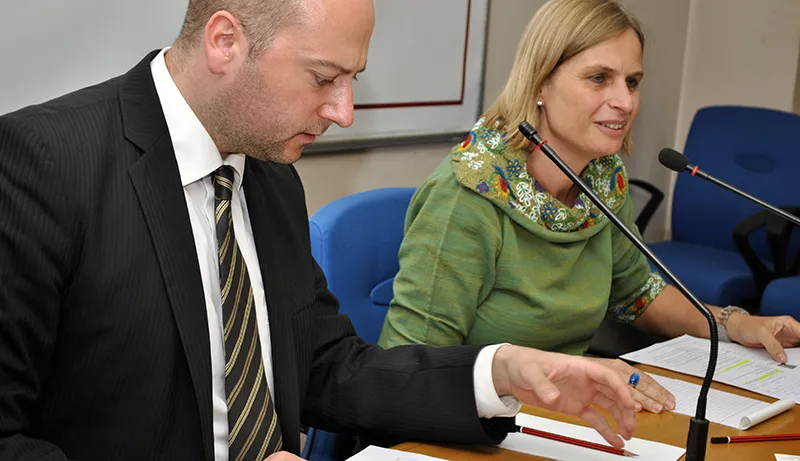The manner in which to determine the relationship between India and Africa is two-fold: micro analysis and macro analysis. This includes focusing on economic and energy diplomacy, political and security engagement and pan-African projects and strategies, says Dr. Arndt Michael of the University of Freiburg, Germany.

The manner in which to determine the relationship between India and Africa is two-fold: micro analysis and macro analysis. This includes focusing on economic and energy diplomacy, political and security engagement and pan-African projects and strategies. This was the thrust of Dr. Arndt Michael’s talk held at Observer Research Foundation, Delhi, on October 15, 2014.
Dr. Arndt Michael is currently the coordinator of the Colloquium politicum at the University of Freiburg and lecturer at the Department of Political Science, Chair for International Relations, University of Freiburg, Germany. He was visiting India to receive the Dr. Gisela Bonn Award instituted by the Indian Council for Cultural Relations (ICCR) for honouring those who have contributed to Indo-German friendship.
The talk started with a presentation by Dr. Michael, where he placed India as the fourth player after China, USA and EU in the new ’scramble’ for African resources and markets. He furthered developed his presentation by stating that India’s relation with Africa are now gaining momentum, particularly in the fields of economy and natural resources as well as in the political and security sphere. He asserted that India has the potential of becoming a ’game changer’ in Africa.
However, Dr. Michael’s research goes further, analysing five categories of Indian African strategy:
1) Dependency in terms of oil gas and resources
2) Hegemony in terms of soft power and hard power projection
3) Balancing, i.e, India’s ambitions internationally vs. Chinese influence
4) Agenda setting and
5) Alliance building.
He further stated that it was with the 1st India African Summit in 2008 and the 2nd India Africa Summit in 2011 that the India -Africa relationship moved towards a new era. There has been an increased focus on economic cooperation (agriculture, trade and finance), political cooperation (peace and security, civil society and good governance), science, technology, research and development (information and communication technology), cooperation in social development and capacity building (education, health), tourism, infrastructure, energy and environment and media and communication.
He also listed, four pillars of India’s engagement with Africa:
1) Training of African officers in India
2) Blue helmet missions in Africa
3) Indian navy in the Indian Ocean
4) Indian defence industry in Africa.
Dr. Michael then compared India’s engagement in Africa with that of China’s. Quantitatively, India still lags significantly in terms of investments made: $45 billion versus China’s $116 billion. However, he noted that India’s relationship is "qualitatively different from China’s."
Indian initiatives focus on energy security, capacity building projects (for example, building of railways) and pan-African engagements (such as the e-network projects).
He concluded by quoting former Prime Minister Manmohan Singh: "We are not in any race or competition with China or any other country. The desire of India and Africa to work together is not new. We don’t seek to impose any pattern in Africa. It’s for the African people to decide on their future. India stands committed to work together with Africa to strengthen our cooperation in every possible way. We wish to be partners in Africa’s resurgence." Dr. Michael emphasised the need for greater engagement between India and Africa through partnership conclaves, conferences and summits.
The talk was chaired by Ms. Britta Petersen, Senior Fellow, ORF and Mr. H H S Viswanathan, Distinguished Fellow, ORF, was the discussant.
(This report is prepared by Arushi Gupta, Research Intern, Observer Research Foundation, Delhi)
The views expressed above belong to the author(s). ORF research and analyses now available on Telegram! Click here to access our curated content — blogs, longforms and interviews.




 PREV
PREV

